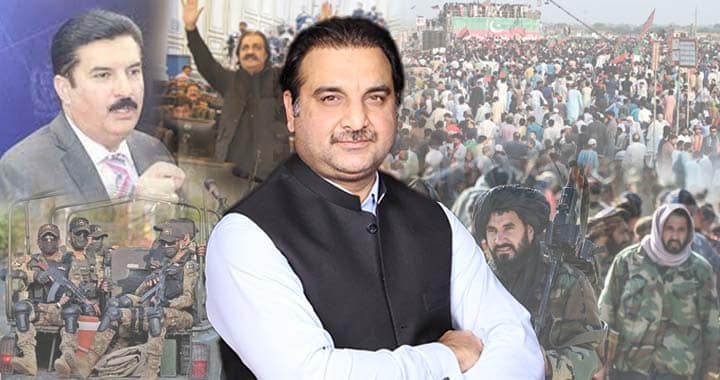The security crisis engulfing Khyber Pakhtunkhwa (KP) has reached a point where deadly attacks and counter-terror operations are now a grim daily routine. Yet the provincial government behaves as if nothing is more urgent than staging political rallies for the release of a single prisoner. This stark mismatch between public need and official priority has become impossible to ignore.
Governor Faisal Karim Kundi recently demanded that Chief Minister Ali Amin Gandapur clarify, on the record, whether he stands with the state or with the terrorists. The charge is not rhetorical. For nineteen months, since the February 2024 election, the Pakistan Tehreek-e-Insaf (PTI) government in KP has devoted its energy to street agitation. The jalsa held last week was the thirteenth or fourteenth such rally. Their sole agenda: “Free prisoner 804,” Imran Khan.
Political gatherings are any party’s constitutional right. But no government anywhere uses state resources to protest instead of governing. A government’s first duty is to legislate, set direction for its bureaucracy and law-enforcement agencies, and provide basic services—health, education, security. KP’s rulers are doing the opposite.
Consider the cost. The November 24 protest alone caused a single provincial department a loss of 500 million rupees when machinery was seized by Islamabad police and remains impounded to this day. That was not Ali Amin Gandapur’s personal property or PTI party equipment. It was public money from a province already burdened by poverty and debt. Equipment worth billions now rusts in Punjab while no one in Peshawar demands its return.
Across a dozen rallies, the hidden expenditures climb into the billions. Preparing each stage alone consumes more than one to three crore rupees. Transporting workers and deploying heavy machinery add far more. These funds come from the provincial secret account, a discretionary pool immune from audit. Money meant for development projects is drained to bankroll political theatre, while the provincial police plead for modern weapons to fight a resurgent militancy.
Meanwhile terrorism spreads. Districts such as Bajaur, Mohmand, South Waziristan and Khyber face intensifying attacks. Reports circulate that even the chief minister seeks “clearance” from militants before visiting his home district of Dera Ismail Khan, allegedly paying them to remain quiet during his stay. If the province’s chief executive must beg extremists for safe passage, what hope remains for ordinary citizens?
The contrast with Balochistan is striking. Despite an equally severe insurgency, Chief Minister Sarfraz Bugti has avoided rallies and focused on law-and-order priorities. KP’s government has instead treated security as a side issue while pouring billions into partisan spectacle.
Nor can the federal government escape blame. Prime Minister Shehbaz Sharif and his cabinet have shown a troubling indifference to KP’s plight. Promised annual transfers of 100 billion rupees to the merged tribal districts have not materialised. High-level meetings with civil and military leadership in Peshawar—where practical counter-terror strategies could be forged—are rare. Political rivalry with PTI seems to outweigh national responsibility.
Beyond Pakistan’s borders, the threat grows. Despite repeated Taliban assurances that no foreign militants operate from Afghan soil, evidence tells another story. Afghan nationals have been identified among those killed in Pakistani operations from Bajaur to Khyber. In Mazar-i-Sharif, a senior Islamic State Khorasan (IS-KP) commander was recently gunned down. Intelligence briefings speak of at least 27 terrorist organisations entrenched in Afghanistan, seventeen of them targeting Pakistan directly: TTP, the Hafiz Gul Bahadur group, Jamaat-ul-Ahrar, the BLA and more. Al-Qaeda remnants, IS-KP camps and other networks flourish with modern weaponry left behind after the U.S. withdrawal.
Regional powers—China, Iran, Russia and Pakistan—have all urged the Taliban to dismantle these sanctuaries and form an inclusive government. But the Taliban fear that confronting these well-armed groups would imperil their own grip on Kabul. Outside actors, from Indian intelligence to other covert sponsors, are eager to keep Afghanistan unstable. For Islamabad, this means the cross-border threat will persist, even as Kabul publicly denies it.
Against this backdrop, KP’s ruling party spends public funds on rallies and Islamabad incursions. Secret-fund disbursements remain unaudited; billions that could arm police or rebuild war-torn districts are squandered. The provincial action plan now being drafted to mirror the National Action Plan might help—if implemented with urgency—but drafting documents is not the same as fighting a war.
The province needs weapons, training and unified leadership. Instead, it has political pageantry and a chief minister who reportedly negotiates with militants for personal security. Federal leaders must also shoulder their constitutional duty, provide promised funds, and treat KP as an integral unit of the federation, not a political enemy’s fiefdom.
Khyber Pakhtunkhwa is under siege. Terrorist networks multiply next door. Public resources vanish into partisan spectacles. Until both provincial and federal governments abandon petty politics for the hard work of governance and security, the people of KP will remain caught between militant violence and official negligence.





